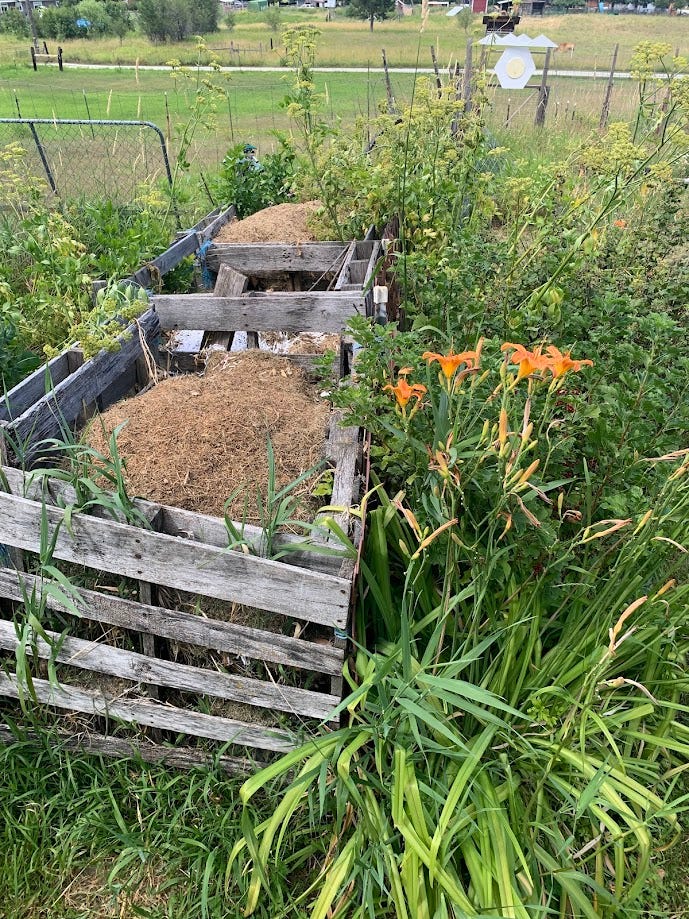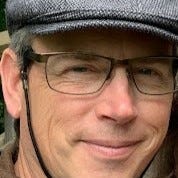What is compost? The process (verb) and product (noun) of items reduced to their basic components. Compost builds life and vitality based on the offering, or giving, of what came before to what comes next. Compost takes scraps of what is no longer needed, mixes them together, and creates a type of catalyst that shares a boost to bring about a healthy outcome.
When does compost go from gross to golden, from disgusting to attractive, from repulsive to requested? A pile of cast-offs transforms into soil, from something our hands throw away to material we love to touch, run our fingers through, and work into gardens with care. Compost-gone-bad has a foul smell, but with attention to correct ratios of nitrogen and carbon mixed with moisture at just the right levels and timing, there are very few off-putting odors. But this process takes patient effort and attention.
Compost benefits from stirring, a procedure that mixes. This changes the chemistry at elemental levels, which is a fancy way to say compost needs to breathe. With access to oxygen, the anaerobic decomposition is released, and fresh air is received; there is an exchange of molecules. This aeration also allows little critters to live, bacteria, bugs, and worms that eat, digest, and excrete, all in the process of reduction, an intensification of prime components. Waste changes from an unhealthy pollutant with destructive side effects into nutrient-rich, renewed Earth.
This pattern of something giving rise to something else is archetypal, woven into the fabric of existence. Nothing on this planet is exclusive, everything is shared. In Christianity, the term cruciform describes the laying down of one life for the benefit of many, like a seed that germinates a new plant that grows to provide food and sustenance. Jesus describes himself as a kernel of wheat planted to give rise to a new crop. Hebrew writers observe in nature the withering of flowers and grasses as an essential step to renewal, and all through the life-death-life cycles, the word of God remains; constant divine energy given to empower form, spirit that fills matter, the Living Christ expressed in all things.
In our cultural experience as post-modern, Western thinkers, we’ve inherited an era of fragmentation, of fracturing and breaking down of systems once thought of as solid, dependable, and inherent to life’s form. This breakdown takes many expressions, from public to personal, and can include religion, politics, and economics, along with social dynamics from family to international society.
These breakdowns coincide with climate change. Some varied effects and expressions of global warming include a waffling jet stream, disruptions to the food chain, acidification of the oceans, stronger storms, intense flooding, record drought, unprecedented heatwaves, or lake-affect blizzards, these types of scenarios signal a shift: away from a stable, predictable, and reliable era to one that makes life harder to manage.
Future generations will notice things, like increases in the percentage of carbon in the atmosphere which cause lower nutrient levels in food. Today’s broccoli is healthier and tomorrow will have deficiencies not even considered in today’s thinking. The myth that each generation is better off than the one before is now exposed as failing. Side effects of the Industrial Age and rationalistic modes of thinking are starting to show glimpses of what will become more common, such as warmer air that holds higher levels of moisture, so rainstorms become torrents; catastrophic wildfires and extended dry seasons that shift migration routes and habitat for birds, in addition to seasonal disruptions that alter timing of food sources. Even small adjustments can be detrimental to reproductive patterns of many species. Like a lineup of dominos, when one goes, others fall. We are amid the sixth great extinction, which is accelerating and open-ended for now.
It is easy to get discouraged, down with despair, or locked into cycles of fear and cynicism through endless critiques yet not many good options to solve what seem like overwhelming dilemmas. Sometimes we grieve over what has been lost. Other times, over what will be lost. Sometimes we fail to grieve because we don’t notice. Perhaps we have selective attention, because the loss can be overwhelming and is too much to comprehend. Either way, we are caught.
This is when the image of compost may offer a glimpse of possibility, a reminder that sometimes things get worse before they get better, but this means they do get better; not only that, but what comes would not have been possible without what looked like an insurmountable, almost total loss. Redemptive outcomes bring new expressions that old systems cannot hold, nor were they designed to.
To say we are in a larger process does not deny the grief, pain, or suffering experienced through the fragmentation. It affirms the importance and value of what came before, recognizes them as essential, as part of the matrix that has led to what is. The decline is very real, and loss is formidable, almost as powerful as life’s relentlessness.
Life has intensity to it. Reality and existence find ways of expression, like plants that sprout through cracks in concrete, or trees that grow from the sides of cliffs. Patience, forgiveness, humility, love; these are essential components that help find fruition in a process that transcends and includes.
Integrate. This is a word that has an archetypal foundation to it, an archaic structure with inherent form. Integrate. This word can help shift from one shape to another, a magical transformation. Integrate. This word knows the stories of the past and is open to future chapters for fluid, dynamic retelling of time’s intensities. To live as an integrated human involves holding everything, but loosely. Humility, compassion, forgiveness, love, connection with all there is, seen and unseen; these are themes which repeat because they are essential elements, basic components, necessary for life to thrive. Transformation to an Integral Structure of consciousness invites us to be poetic.
Farmers know the science behind fertilizer, what it is crops need to increase yields. But real farmers are less technicians or land managers than they are artists and homesteading Earth-observers who co-create with Originary energies to bring about new life. Real farmers are discerning. They have respect for what is beneficial, rather than selfish. They are not greedy but can intuit what is helpful and healing and leads to wellness and wholeness in beneficial ways. They are open yet grounded to physical, spiritual, emotional, and relational aspects of what seeks to emerge and find expression. They take reality as presented, for real farmers, like all creatives, are midwives or stewards who know and partner with the Source of transformation.
As I stir compost piles on a sunny day in mid-July, the skies are clear but getting smoky as climactic feedback loops are harbingers of things to come. I hope what soil I help create can be of benefit to gardens and trees for future generations. When timescales overlap and continents shift as geological history continues to unfold, I entrust the essential components of my life’s small, short thread as a colorful strand in life’s larger tapestry, a natural fiber interwoven and integrated into planetary patterns that share beyond words the art of living.







